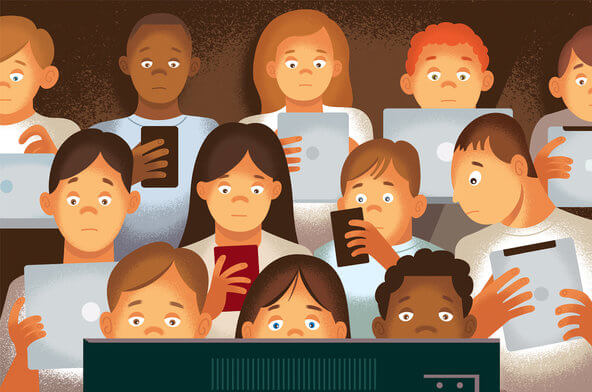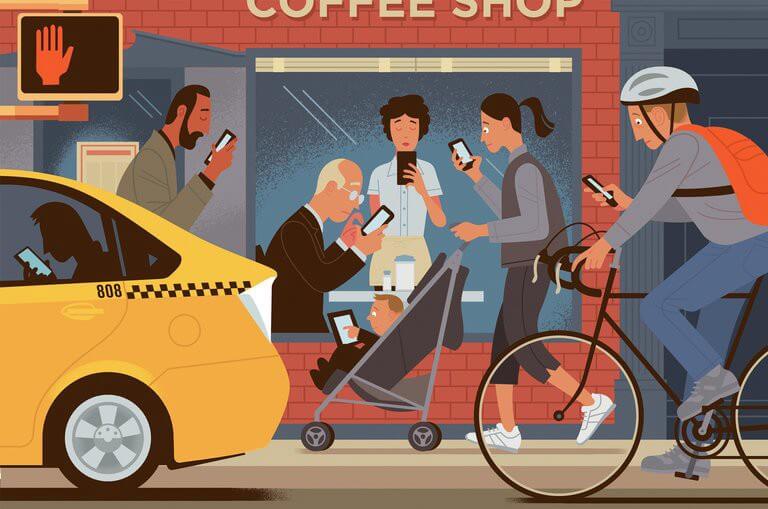The Most Reliable Parental Control App
FamiSafe lets parents control screen time, track real-time location and detect inappropriate content on kids' devices.
We are living in a digital age where devices like smartphones, tablets, and laptops have become a critical part of our lives. From study and work to entertainment and routine tasks, you can do everything on this tiny gadget in your hand. Although these devices have made our lives easier, they also have negative impacts on our health, particularly their excessive usage.
Average time spent by an individual using a particular device is referred to as screen time, which is usually calculated in hours per day. According to CNN, the average screen time for adults in the US reached up to 19 hours during the pandemic, which is quite alarming. IT professionals and individuals who spend hours on computers often report problems like anxiety, depression, obesity, sleep disorder, and chronic neck and back problems.
Part 1: How Much Screen Time is Too Much for Adults?

Indeed, we cannot avoid using digital devices in today’s era of digital transformation. What we can do, however, is to limit our screen time to maintain our healthy work-life balance. In this regard, several studies have been conducted globally highlighting the importance of controlling screen time for mental and physical health.
The majority of researchers worldwide agree that a large number of people across the globe are rapidly adopting a screen-obsessed lifestyle. This means the average screen time among adults in developed countries has reached a dangerous level. For instance, a study conducted by a Singapore-based insurance company AIA revealed over 50% of Singapore’s adult population has become internet addicts. Similarly, the US residents spent approximately 19 hours using their digital devices amid the pandemic.
What do the Experts Say?
Health professionals and wellness experts strongly discourage the excessive use of smartphones both for kids and adults. Spending too much time before screens can have a range of negative impacts on our mental and physical health.
A study conducted by the National Center for Biotechnology Information (NCBI) found an average screen time of six hours or more could lead to depression and anxiety among adults. Likewise, another research indicated spending seven hours or more using digital devices has two times more risk of getting diagnosed with depression or anxiety. It can be concluded based on the findings of these two studies that we should not spend more than six hours a day before screens to lead a healthy life.
Ideal Screen Time for Different Age Groups
Experts give different recommendations for average screen time for different age groups. While adults are not excluded, more importance is given to children who are highly vulnerable to health issues due to the excessive use of digital devices.
The following table presents ideal screen time for both kids and adults:
Age Group |
Screen Time |
| 0-18 months | Minimum Possible |
| 18-24 months | 30 minutes a day |
| 2-5 years | 1-2 hours a day |
| 5-12 years | 2-3 hours a day |
| 12-20 years | 2-4 hours a day |
| More than 20 years | Less than 6 hours a day |
Common Signs of Addiction
It’s very easy to identify whether you have become screen-obsessed or not. If you have any of the following signs, you must reduce your screen time today:
Signs of having too much screen time
- You feel anxiety when your smartphone or laptop is not working;
- You remain uneasy as long as your phone is not connected to the Wi-Fi;
- You’re suffering from dwindling productivity and motivation due to spending too much time doing leisure surfing while working;
- You’re experiencing unexplained muscle aches;
- You feel anxiety, depression, and back problems;
- You’re unable to focus on your work and meet your deadlines despite knowing a lot of tasks are still pending;
- You’re skipping social gatherings or spending very little time with your family; and
- You’re getting a sense something is missing in your life.
Part 2: Negative Effects of too Much Screen Time for Adults

Excessive use of smartphones not only deteriorates your health but also negatively affects your social life. Given below are some of the common effects of too much screen time for adults:
Bad Health
Spending hours and hours looking at screens causes fatigue and lowers your eyesight. The glare coming out of the screen of a smartphone or computer places a strain on the user’s eyes that often leads to headaches. Besides, this light also keeps your brain awake day and night and causes insomnia or sleep issues. Similarly, maintaining fix position in front of your computer for an extended time results in severe musculoskeletal issues.
Social Issues
Several studies have indicated the negative impacts of smartphones and social networking websites on an individual’s social life. People remaining online on social media for hours often develop addictive behaviors such as thinking about the particular platform all the time or experiencing symptoms of withdrawal for not being able to access their accounts. Such behaviors can’t be ignored and often interfere with real-life if not taken care of.
Changes in Cognition
Those individuals who have become smartphone addicts are often diagnosed with poorer cognitive performance due to the inability of their brains to transmit messages quickly and efficiently. This means they take more time understanding simple things and are unable to make timely decisions.
Lack of Professional Development
Although the internet has enabled us to develop advanced skills by accessing various resources online, you can’t learn everything on digital devices. For instance, individuals spending over 10 hours on smartphones or laptops can’t find enough time to go outside and participate in physical activities. Hence, they never develop professional skills like teamwork, sportsmanship, time management, effective communication, conflict resolution, and ambition to achieve the desired objectives.
Part 3: How to Reduce Your Screen Time?

Follow any of these three tips to reduce your screen time and live a healthy life:
1. Have More Real-life Interactions
The virtual world of social media is entirely different from real life. Doesn’t matter how many friends you have on Facebook, regular interaction with your real-life friends and family members is very critical. Hence, it’s better to have more real-life interactions instead of spending hours and hours chatting online with anonymous users or so-called social media friends.
2. Turn off Notifications
Having so many apps on your smartphone incites you to check your device after every 5 to 10 minutes. However, turning off the notifications or putting your smartphone in silent mode can help you stay away from your device and reduce your screen time.
3. Adopt an Active Lifestyle
Another way to control your screen time is by adopting a more active lifestyle and actively participating in physical activities. For instance, go to a nearby park in the evening or have some exercise at some gymnasium. You can also play indoor games if you like to keep yourself away from your smartphone.
4. Use FamiSafe
If you find it extremely difficult to limit screen time, try using parental control apps like FamiSafe. Its Screen Time feature allows you to control how many hours a day you can use your device. Once you have reached that limit, your device will automatically turn off and you won’t be able to use it unless the preset time passes. This way, you can prevent yourself from excessively using your smartphone and can reduce your average screen time.
Part4. FAQ
1. What’s the average screen time for teens?
Experts give different recommendations for average screen time for kids of different ages. For example, children less than 13 years old should not be exposed to the screens for more than 3 hours. Instead, they should be encouraged to participate in outdoor games and physical exercises. Children from the 13-19 age group should not spend more than 4 hours a day using smartphones or laptops.
Play this video to learn about screen time limits.
2. What’s the average screen time for Adults?
Most researchers and healthcare experts believe using digital devices for more than 6 hours a day can have severe consequences on an individual’s health. Hence, the average screen time for adults should be less than 6 hours a day.
Wondershare Famisafe
FamiSafe lets parents control screen time, track real-time location and detect inappropriate content on kids' devices.

Conclusion
Digital transformation is gradually shaping our lives by providing us with various opportunities to bring convenience to our lives. At the same time, they are also negatively affecting our health and social lives. One key aspect is the excessive use of smartphones or laptops that results in different problems.
It has been confirmed by researchers that an average screen time of more than 6 hours leads to healthcare issues like obesity, depression, anxiety, insomnia, headache, eye strain, and back pain. Adapting a screen-obsessed lifestyle brings changes in cognition, creates social issues, and disturbs the work-life balance.
